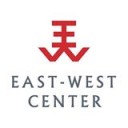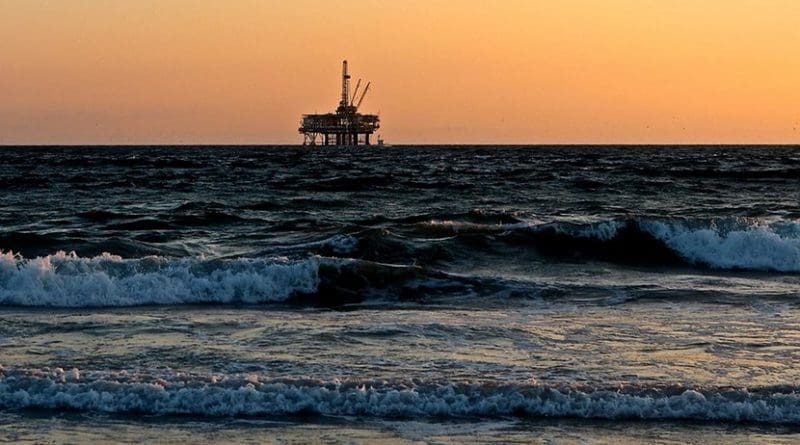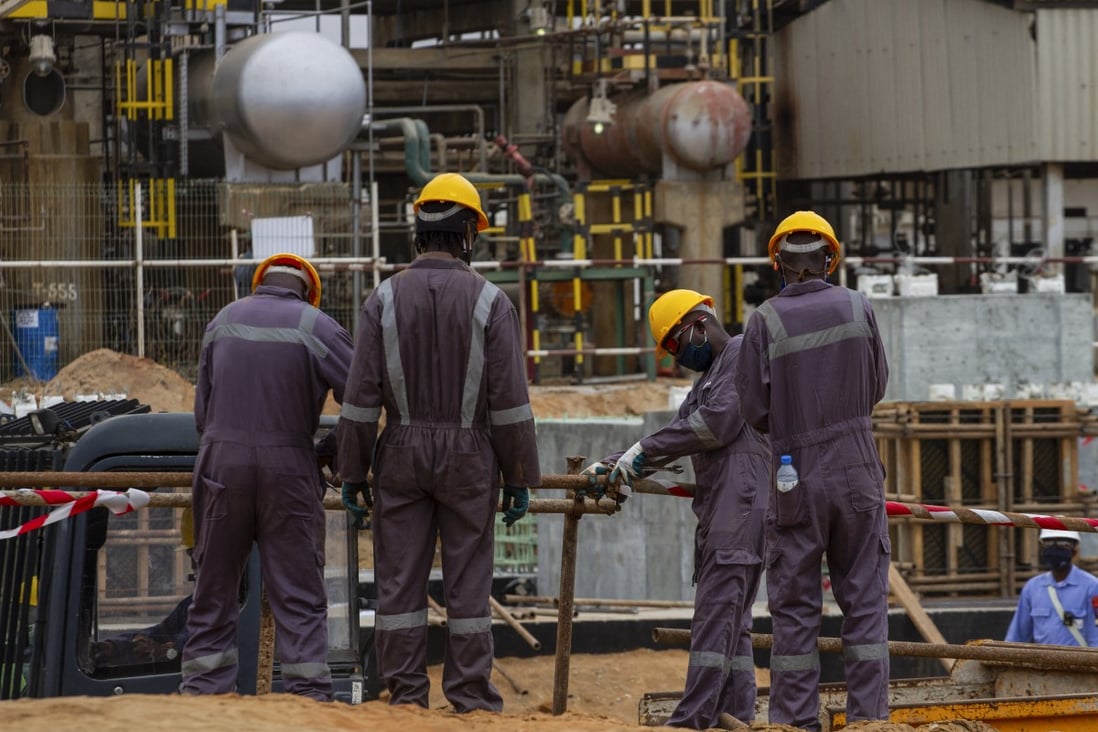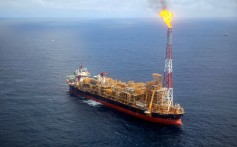China And Angola: From The Pioneering ‘Angolan Model’ To A ‘New’ Relationship – Analysis

China's President Xi Jinping with Angola's President João Manuel Gonçalves Lourenço. Photo Credit: Chinese government
By Sumie Yoshikawa
China has made large loans to African countries with rich natural resources, especially Angola in southwest Africa. China provided 258 loans totaling US$45 billion to Angola, of which US$25.9 billion was invested in the energy sector from 2000 to 2022.1 Chinese loans to Angola amount to more than a quarter of the total loans to all African countries and make China the largest lender to Angola. In return, China has acquired African, and particularly Angolan, natural resources to meet China’s high domestic energy demands.
Since the end of its civil war in 2002, Angola has achieved rapid economic growth by building infrastructure and accelerating oil development and its exports with the help of Chinese loans. Angola became the largest African exporter of petroleum to China. Angola has paid the majority of its debt to China in the form of extracted oil. This contractual arrangement, known as the “Angolan model,” has attracted international attention and criticism.2 Lucy Corkin has argued that despite the importance of the trading of oil for the Sino-Angolan relationship, the arrangement does not bode well for the relationship’s sustainability.
Both China and Angola see each other as necessary strategic allies for the foreseeable future, but this may obscure what is an uneasy “marriage of convenience.”3 Ian Taylor et al. believe the “marriage of convenience” is experiencing a period of rocky introspection to such an extent as to challenge the notion that China has decisive political sway over Angola.4
The beneficial impact of China’s large loans, however, is limited. The loans enriched only a small segment of Angola’s elite circle and badly worsened corruption. The majority of Angola’s people remained impoverished. The drop in global oil prices since 2014 has left Angola in serious economic distress. Moreover, Angola’s oil production has peaked, and shipments have begun to decline. The “Angolan model” of collateralizing oil for loans has become increas- ingly difficult to sustain. Angolan President João Manuel Gonçalves Lourenço, who took over in 2017, has taken new initiatives during the economic recession and cracked down on the previous administration and its corruption, seeking to restructure external relations. I will consider why and how China invested heavily in Angola’s oil sector, and how the relationship between China and Angola has changed under the new Angolan administration.
The “Angolan Model” and Petroleum
A brief review of China-Angola relations and Chinese investments in the latter’s oil sector since the end of the Angolan Civil War is useful. In 1975, Angola gained independence from Portugal when the Popular Movement for the Liberation of Angola (MPLA) seized control of the capital Luanda and its oil resources and declared independence. Angola then descended into a full-scale civil war between three insurgent organizations: the MPLA, National Union for the Total Independence of Angola (UNITA), and National Liberation Front of Angola (FNLA), each based on different ethnic groups. China initially supported UNITA, which controlled diamond reserves in the inner region. Due to the complex international context of the Cold War, it was not until 1983 that China and Angola established diplomatic relations. With the end of the Cold War, intergovernmental cooperation between China and Angola finally began in the 1990s.
After becoming a net importer of oil in 1993, China became interested in importing oil from resource-rich African countries. In the 2000s, China’s state-owned enterprises (SOEs) began to expand into African countries in full swing. China’s “going out” strategy encouraged these moves. The Chinese government actively encouraged Chinese enterprises to expand their investment overseas. This strategy contrasted with the “bringing in” strategy of introducing foreign capital into China, implemented since the reform and opening-up of the 1980s The Chinese government fully implemented the “going out” strategy after 2000. In Africa, China’s major SOEs targeted mainly two areas: natural resources and infrastructure construction.
China has invested heavily in Angola since the end of the civil war in 2002. Initially, Angola sought national reconstruction funds from the International Monetary Fund (IMF). However, negotiations between Angola and the IMF stalled due to the lack of transparency in Angola’s finances, especially the balance of payments of the National Oil Corporation, which had supported Angola’s postwar economy. China intervened and lent a hand. In 2004, the Angolan government signed a US$2 billion loan agreement with China, which triggered a massive increase in oil production and the start of Angola’s rapid economic growth. The Angolan government turned to relying on China.5
China provided huge loans to Angola by collateralizing oil. The international community named the contractual arrangement the “Angolan model.” China agreed on a resource for infrastructure (RFI) deal in which Angola would supply natural resources in exchange for China building infrastructure in Angola. With the formalization of the mining relationship, China received international criticism for “neocolonialism.”6 Using the Angola case as a model, China has spread RFI deals to other African countries and beyond.7
China’s loans to Angola continued to increase, reaching a cumulative amount exceeding $40 billion. In addition to infrastructure construction related to the oil industry, China has built railroads, ports, and housing by providing loans for these projects. In an important sense China has been deeply involved in nation-building in Angola, but with a significant downside: the Chinese government’s “going out” strategy pumps large loans into African countries that are at high risk of corruption. At the same time, the oil imported from Angola helps to sustain rapid economic growth in China.
Chinese SOEs in Angola’s Oil Sector
Let us look at Chinese involvement, including loans, in Angola’s oil industry. Both the Chinese side and the Angolan side of the loan process have lacked transparency, leading to the emergence of several problems. China’s involvement in the Angolan oil sector was built on a cooperative relationship with Sonangol, a major state-owned enterprise with its headquarters in the capital city of Luanda. The three major Chinese oil companies—China National Petroleum Corporation (CNPC), China Petroeum and Chemical Corporation (Sinopec), and China National Offshore Oil Corporation (CNOOC)—do not operate independently, and their involvement in Angola has been based solely on their relationship with the Sonangol.8
China and Angola first established two joint venture companies, China Sonangol International Holding (CSIH) and China Sonangol International (CSI). In 2004, CSIH and CSI established Sonangol Sinopec International (SSI). In general, the two countries have agreed that the Export-Import Bank of China will provide loans to Angola and that the loans will be jointly administered by the Angolan Ministry of Finance and the Chinese Ministry of Commerce.9 A Chinese state oil company, usually Sinopec, will extract Angola’s petroleum in collaboration with Sonangol.10
In addition to the process of public inflows, there is reportedly a “shadow” financing structure between China and Angola. The China International Fund (CIF) is famous in the oil sector. It is managed by the Queensway 88 group, ostensibly a private Hong Kong-based firm. A US Congressional report claims the CIF is linked to both the Ministry of Public Security and the Ministry of State Security in China.11 The Gabinete de Reconstrução Nacional (GRN), Angola Reconstruction Agency, has managed loans from the CIF. President Jose Eduardo dos Santos, who ruled Angola from 1979 to 2017, created GRN in 2005 to facilitate rapid infrastructure reconstruction before national elections. The CIF and GRN institutions are accountable only to the President.12 Both have been operating without the accountability demanded by Western standards, with extremely opaque management and accounting flows and a lack of international observation.
One of the biggest proponents of China’s increased involvement in Angola’s oil sector has been dos Santos, widely criticized as a dictator who created one of the most corrupt regimes in Africa. Dos Santos had used Sonangol for fund- raising since 1979. The company reportedly functions for the benefit of dos Santos, his 4 family and friends.13 Many of the key members of the MPLA and Sonangol’s board of directors are connected by blood and friendship to form an exclusive social circle. This group was often called Futunguistas, after the name of one of dos Santos’s presidential palaces. They monopolizing the wealth of Angola’s economic growth. The Chinese SOEs that conducted business in Angola developed personal relationships with the Futunguistas.
Contracts between Chinese companies and Angolan elites were not transparent, and corruption was widespread. Much of the profits went to families and associates of dos Santos. In 2015, Chinese authorities arrested Sam Pa, CEO of the CIF, which had promoted business in Angola, on corruption charges related to Sinopec’s oil license bid in Angola. CIF was reportedly complicit in corrupt dealings with the Angolan side in numerous projects in Angola.14 While some of the elite groups had acquired enormous wealth, the Angolan people have remained in chronic poverty and have not been able to benefit from the oil sales. Corruption and social injustice exacerbated civil unrest and led to protests against both Angolan authorities and Chinese companies. The dos Santos administration, however, restricted the activities of media organizations and journalists, silencing criticism of China’s growing role in Angola, serious corruption, labor exploitation, job competition, and other related problems.
China developed a special relationship with some of Angola’s elites in the oil sector, allowing money to flow into the country in a manner that remained opaque to the outside world.
Problems with China’s Investment in Angola
In 2017, dos Santos stepped down after 38 years as President and was replaced by new President Lourenço. At the time of the change of government, Angola was experiencing serious economic hardship, a major cause being the huge loans from China and the burden of repayment.
First, the “Angolan Model” of Chinese loans based on oil has become unsustainable due to the drop in global oil prices and decline in Angolan oil production. The model was initially promising. After China made huge loans to African countries, these African economies began experiencing high growth due to the resource boom. Angola’s economy, in particular, experienced high growth based on the oil business. However, international oil prices started to plummet in 2014, and the Angolan economy fell into chaos. Although the repayment terms of some of the Chinese loans are unknown, many are reportedly linked to the price of oil. The drop in the price of oil means more oil is needed to repay the debt. Angola had to export more oil to China, its largest creditor, than it had before.
After expanding its foreign currency borrowing, Angola’s cash flow rapidly deteriorated, and in 2016 it began asking for assistance from the IMF. Angola discussed the condition of accepting reforms to restore its public finances in exchange for receiving financial assistance from the IMF. Furthermore, during the same period, production peaked in most of Angola’s onshore oil fields. Since then, the amount of oil extracted gradually declined. Angola owed China more than $40 billion and was running out of the chief means of repaying the debt. This created incentives for Lourenço to reduce economic reliance on the oil industry and to diversify the Angolan economy.
The second problem was the poor governance that had become prevalent in the previous dos Santos administration, exacerbated by the corruption fueled by Chinese loans. Dos Santos and some of his aides who managed Chinese loans and projects had amassed enormous wealth, while the majority of Angolans remained poor. The Lourenço administration launched an anti-corruption campaign immediately after taking office. The campaign was aimed at eradicating the corrupt practices that had ballooned during the dos Santos era. In a symbolic incident, Isabel dos Santos, the former President’s eldest daughter, was removed from her position as CEO of Sonangol. Ministers and state officials close to the former president were also removed due to corruption.15
With ample resources, Angola could have had a much higher average standard of living had the dos Santos regime been interested in spreading the wealth beyond his family and cronies. China shares in the blame. Luanda Leaks, which revealed the corrupt methods by which dos Santos allegedly amassed his $2 billion fortune, also mentions the involvement of Chinese SOEs in a complex web of corruption.16 Chinese SOEs have developed personal relationships with Angolan bureaucrats, but many of the bureaucrats have lost their jobs on corruption charges. At the same time, the Chinese government undertook its own anti-corruption campaign. Chinese SOEs operating in Angola are clearly worse off with the departure of the dos Santos government.
Third, Chinese investments did not fulfill the expectations of improving Angola’s technological capacity and infrastructure. Chinese- funded infrastructure projects in Angola were undertaken by Chinese companies, which brought in large numbers of workers from mainland China. Angolan workers were largely excluded. When they were hired, it was mainly simple labor on Chinese projects under Chinese supervisors. In addition, many of the roads, houses, and buildings constructed by Chinese companies were of remarkably low quality. The hospital built in Luanda was abandoned soon after its completion due to fears that it would collapse.17
Faced with numerous problems, the Lourenço administration has been trying to change the country’s strategy. It criticized the investment agreements with China signed by the previous administration and canceled a few. The new administration arrested key figures from the previous administration and promoted anti-corruption measures. It initiated reforms to improve the business environment because Angola needed to attract new private investments to develop its non-oil sector industries. The new administration is trying to rebuild its relations between China and Western countries, strengthening international partnerships. Lourenço has particularly emphasized relations with China and other developed countries such as the U.S., France, Italy, and Japan as strategic partner countries. He has supported a policy of further strengthening cooperation with foreign partners and diversifying Angola’s economy.18 The new Angolan government has concluded that the “Angolan Model” of loans and oil exports is already unsustainable, and that continuing to rely on it is a threat to the country’s economic stability.
Prospects for the China-Angola Relationship
To assess the prospects of the relationship, let us first summarize China’s involvement in Angola’s oil market. Most of Angola’s onshore oil fields have matured and the amount of oil extracted has been declining, which means Angola’s further oil production would be conducted in deepwater and ultra-deepwater fields. Chinese SOEs, however, do not have the technical capabilities to drill deepwater oil wells on their own and are forced to partner with experienced major Western oil companies.19 In their current operations in Angola, Chinese companies are still dependent on Western companies with technology. Chinese SOEs do not enjoy a monopoly in the Angolan oil industry, but are merely cooperating with Sonangol and participating in the complex structure of the Angolan oil domain, which involves many major Western companies.
Furthermore, China is increasingly looking to the Middle East and Russia for its oil imports. Angola’s oil supplies to China are on the decline. In 2006, Angola overtook Saudi Arabia, albeit temporarily, to become the number one supplier of oil to China. Afterward, Angola supplied as much oil to China as did Saudi Arabia. In recent years, however, China has increased its purchases from Russia and Iraq. This is partly due to China’s growing interest in Russia and the Middle East, as exemplified by China’s support for Russia’s invasion of Ukraine on the one hand, and its efforts to mediate relations between Saudi Arabia and Iran on the other hand. Although Angola remains one of China’s top suppliers of oil, Angola’s shipments to the latter have been declining partly because of the renegotiation of the Lourenço government’s debt with China. Worse still, China’s robust demand for oil will face limits. China has been shifting its industrial structure from resource intensive construction and manufacturing to services and consumption. Coupled with the stagnant Chinese economy, China presents many uncertainties as a major market for a supplier such as Angola.
Beijing is also becoming more cautious about large loans in Africa and is reducing its investments. Now that China’s ravenous pursuit of resources has subsided, there is no sign of another resource boom similar to the millennium years. African economies will return to a low-growth trend without boosts coming from China. As Sino-African relations expanded rapidly in the 2000s, the “Angolan model” of repaying Chinese loans with natural resources spread elsewhere on the African continent with similar arrangements. Such loans have come under severe international criticism. Under the Chinese “going out” policy, irrational economic activities such as China’s cavalierly signing expensive deals with resource-rich African countries in the 2000s have decreased. Many of the loans that China has granted to African countries have become non-performing loans, and the Chinese government expects to force the repayment of these debts.
It is possible that the achievement of Beijing’s true objectives in investing in Africa do not require African countries to repay their loans. If so, China may see advantages in continuing to invest heavily in countries such as Angola. However, managing and operating these far-flung assets will saddle China with new and heavy burdens as well as drawing China deeper into Africa’s problems in the future.
What does the future hold for China-Angola relations? Chinese loans have been channeled through the state-controlled oil industry in Angola and the political elite of the former President dos Santos. While the projects paid for by the loans seemed necessary and appeared efficient in the short term, they were not politi- cally, economically, or environmentally sustainable in the long term for Angola. The Angolan side hopes to develop its relationship with China from its previous focus on loans to a new paradigm of diversified private investments. This new trend does not mean that the Angolan government is trying to drive China away.
Angola is seeking to develop non-oil industries and has been vocal about attracting private investments. As Angola pursues this strategy, China’s role will not necessarily decrease and may increase.
Countries that are critically dependent on selling off their natural resources often suffer from fundamental weaknesses in governance. They find it difficult to break away from their dependence sales of non-renewable resources to raise revenue. There are, however, inspiring exceptions. Malaysia, for example, was able to channel income from natural resources to investments in manufacturing. The chances of the Lourenço administration achieving a simi- lar success will be improved if it can be more transparent in the management of its resource sectors, force the bureaucracy to implement the planned economic diversification, prevent corruption, and make the management of its natural resources more efficient.
In 2018, Angola signed the “One Belt, One Road (OBOR)” memorandum in Beijing. The OBOR has expanded beyond traditional infra- structure development. It now includes the Digital Silk Road and the Health Silk Road. China is increasingly targeting high-value markets in African countries, including technology, telecommunications, and green energy. The relationship between China and Angola has been changing with the COVID-19 pandemic,the growth of Angola’s debt burden to China, and the decline of Chinese loans to African countries. Although the relationship between the two countries remains oil-centric, it has been shifting to other areas of investment such as telecommunications technology. Chinese technology giants such as Huawei are helping create the infrastructure needed to develop the Digital Silk Road in Africa. In March 2022, Huawei and Angolan telecom service provider Unitel signed an agreement that will see the former provide a range of green energy solutions to the latter’s operations.20 While oil remains paramount for China and Angola, cooperation between the two countries is gradually expanding into broader areas beyond energy and infrastructure. Economic diversification could be part of a broader reshaping of the relationship that would contribute to more equitable prosperity as well as stable economic development in Angola.
- About the author: Sumie Yoshikawa is an associate professor of the School of Law at Senshu University in Tokyo and a visiting scholar at the East-West Center. She specializes in China’s foreign policy and East Asian international relations.
- Source: This article was published by East-West Center
- Footnotes: Please refer to the original article

East-West Center
The East-West Center promotes better relations and understanding among the people and nations of the United States, Asia, and the Pacific through cooperative study, research, and dialogue. Established by the U.S. Congress in 1960, the Center serves as a resource for information and analysis on critical issues of common concern, bringing people together to exchange views, build expertise, and develop policy options.





